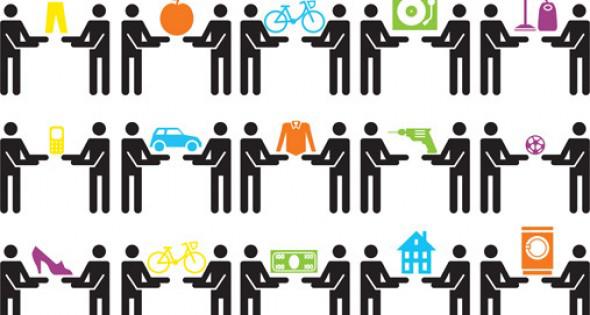 Image Credit: Collaborative Consumption
Image Credit: Collaborative Consumption
Five years ago I was living in South America and working in international development through the non-profit organization CUSO International. Early on in my placement, our group met two travellers passing though the capital, one from France and one from Spain. Their stated goal was to travel the world without any money. That’s right…with absolutely no money at all. To accomplish this they were “couch surfing” and using the “sharing community” and giving back in kind by sharing their philosophy with those who would listen. All they owned was a single small backpack full of clothes and a wi-fi dependent laptop each. We were all both amazed and a bit appalled by them.
Despite the fact that they seemed to always conveniently drop in near dinnertime, the concepts they believed in and shared with us (global community support options, the need for more trust between strangers, barter and trade as viable economic systems) are all now in vogue via the internet, and are challenging some of our economies biggest industries to their core. It seems these fine “surfers” were well ahead of the global trend towards sharing.
The movement is also called “Collaborative Consumption”, or the “We Economy”, and app based companies are popping up all over the world. Big names like Uber, AirBnB, and Couchsurfing are well known, but the “We Economy” also includes smaller lesser known local food shares, meal shares, clothing swaps and ride-share programs. Some of these programs do charge fees, other charge percentages, others are free to use. The concepts of individuals sharing their own resources is impacting mainstream business models and perhaps changing how we relate to each other. Sustainability, less waste, and do-it-yourself are all common mantras of such services. How many cars drive down the highway with one passenger? How many spare rooms are vacant? How many of us have leftovers we can’t eat? Who can we share with and who can share costs with us?
Trust is a key component to the “We Economy”, and when letting out your home, car, couch, or kitchen to a stranger you just met online, you ARE putting some faith in the kindness of strangers, and in technology screening systems. Perhaps we are growing as humans, and the Internet lets us feel closer to our global neighbours if we choose to let it. If we can trust technology to give us feedback loops, then what else can we trust?
Even though sharing and bartering has been going on for thousands of years, the growth it is now seeing in our economy is at a new high. According to this article in Forbes - “the equivalent revenue flowing through the share economy directly into people’s wallets will surpass $3.5 billion this year, with growth exceeding 25%.”
"I think the thing about the sharing economy is we still don't know what it is yet. Things that happen have been happening through all of humanity, in our communities for thousands of years," said Milicent Johnson, director of partnerships and community building at Peers, "At the same time we have new ways people can share or collaborate with other people — it's really important we understand what's happening and people aren't doing it alone."
The new economy of sharing does offer something that non-profits can learn from according to Marc Gunther of “A Medium Corporation”. “Fueled by data and insights, the social sector as a whole, if all goes according to plan, would become more dynamic, innovative and powerful. It would function more like a market, with dollars flowing to high-performing nonprofits.”
We could benefit if we trust each other more seems to be the lesson we can learn from the sharing economy. For example: “The Basic Registry of Identified Global Entities (BRIDGE) is a new collaborative project that aims to revolutionize information sharing, in order to better understand the flows of philanthropic dollars and enhance transparency and effectiveness in the global social sector.” Read the whole article by Marc Gunther here.
If we can share our couches, our cars, our kitchens, surely we can share what we’ve learned and work together to help those we commonly support.
Those two travelers from Europe I met five years ago, who somehow managed to hitch a ride on an oil tanker across the Atlantic Ocean (both ways) were on to something that clearly has the potential to allow us all to give back.
